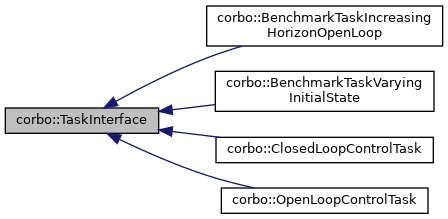Interface class for tasks. More...
#include <task_interface.h>

Public Types | |
| using | Ptr = std::shared_ptr< TaskInterface > |
Public Member Functions | |
| virtual void | getAvailableSignals (const Environment &environment, SignalTargetInterface &signal_target, const std::string &ns="") const |
| Retrieve available signals from the task. More... | |
| virtual Ptr | getInstance () const =0 |
| Return a newly created shared instance of the implemented class. More... | |
| virtual void | performTask (Environment &environment, SignalTargetInterface *signal_target=nullptr, std::string *msg=nullptr, const std::string &ns="")=0 |
| Perform task. More... | |
| virtual void | reset ()=0 |
| Reset task state. More... | |
| virtual bool | verify (const Environment &environment, std::string *msg=nullptr) const =0 |
| Check if the environment and other settings satisfy all requirements for the given task. More... | |
| virtual | ~TaskInterface () |
| Virtuel destructor. More... | |
Detailed Description
Interface class for tasks.
Possible task implementations can be the closed-loop control of a plant, open-loop control, benchmarking, ...
Usually, tasks are called with an Environment to facilitate the initialization and verification of commonly used control architectures. An Environment contains a plant, observer and controller. But a particular task does not need to rely on an Environment only but can contain more objects or replace objects (e.g. multiple controllers, ...).
- Remarks
- This interface is provided with factory support (TaskFactory).
- See also
- Environment
Definition at line 60 of file task_interface.h.
Member Typedef Documentation
◆ Ptr
| using corbo::TaskInterface::Ptr = std::shared_ptr<TaskInterface> |
Definition at line 63 of file task_interface.h.
Constructor & Destructor Documentation
◆ ~TaskInterface()
|
inlinevirtual |
Virtuel destructor.
Definition at line 66 of file task_interface.h.
Member Function Documentation
◆ getAvailableSignals()
|
inlinevirtual |
Retrieve available signals from the task.
Register a-priori known signals at the signal target. Registration is optional. Note, during performTask() further signals might occur without registration (in case the they are not known in advance or the implementation lacks a proper registration).
- Parameters
-
[in,out] signal_target Target for occuring signals [optional]
Reimplemented in corbo::ClosedLoopControlTask, corbo::OpenLoopControlTask, corbo::BenchmarkTaskIncreasingHorizonOpenLoop, and corbo::BenchmarkTaskVaryingInitialState.
Definition at line 103 of file task_interface.h.
◆ getInstance()
|
pure virtual |
Return a newly created shared instance of the implemented class.
Implemented in corbo::ClosedLoopControlTask, corbo::OpenLoopControlTask, corbo::BenchmarkTaskIncreasingHorizonOpenLoop, and corbo::BenchmarkTaskVaryingInitialState.
◆ performTask()
|
pure virtual |
Perform task.
- Parameters
-
[in] environment Standard environment (plant, controller, observer) [in,out] signal_target Target for occuring signals [optional]
Implemented in corbo::ClosedLoopControlTask, corbo::OpenLoopControlTask, corbo::BenchmarkTaskIncreasingHorizonOpenLoop, and corbo::BenchmarkTaskVaryingInitialState.
◆ reset()
|
pure virtual |
Reset task state.
Implemented in corbo::ClosedLoopControlTask, corbo::OpenLoopControlTask, corbo::BenchmarkTaskIncreasingHorizonOpenLoop, and corbo::BenchmarkTaskVaryingInitialState.
◆ verify()
|
pure virtual |
Check if the environment and other settings satisfy all requirements for the given task.
This function can be called in order to check if all components and models are appropriate, e.g. if all input and output dimensions are chosen adequately.
Note, Environment::verify() might be invoked in order to check if controller, plant and observer are specified correctly and if they have matching dimensions.
- Parameters
-
[in] environment Standard environment (plant, controller, observer) [out] msg The string contains issue messages and hints if available [optional]
- Returns
- true if verification was successfull, false otherwise.
Implemented in corbo::ClosedLoopControlTask, corbo::OpenLoopControlTask, corbo::BenchmarkTaskIncreasingHorizonOpenLoop, and corbo::BenchmarkTaskVaryingInitialState.
The documentation for this class was generated from the following file: